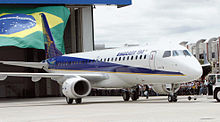Technology
Brazilian science and technology have achieved a significant place in the international arena in the last decades. Brazil is in the top 10 of most industries in the world and the high literacy rate and good educational system creates a sound foundation for future developments.

Embrear 190
Basic, technological and applied research is mostly carried out in public universities and research institutes, although there are some private institutions and non-profit non-governmental organizations that also have research programs. That said, usually the funding still comes from government.
The Brazilian Space Agency has the most advanced space program in Latin America, with significant capabilities to launch vehicles, launch sites and satellite manufacturing.
Statistics:
- Biggest aerospace power of the southern hemisphere
- Biggest fixed line telephone market of Latin America
- 3rd in the world in the aircraft industry
- 3rd biggest global steel?making power
- 3rd in the world computer market
- 4th biggest TV network in the world
- 5th biggest mobile phone market.
- 7th biggest manufacturer of cars in the world car
- 8th world oil power
- 10th world producer of capital goods.
Infrastructure and industry sectors
Transportation, utilities and telecommunications are of fundamental
importance because of the size of the country and the growing demands of
industry. The postal service is generally adequate and in major centers
messenger services are widely used. There is an extensive air travel and
domestic ground transportation network. Regular international services
are provided by national and foreign airlines to all parts of the world.
Railroad facilities are underdeveloped, the principal lines being in the
states of São Paulo and Rio de Janeiro. The privatization of railroads and
ports is also considered the solution for developing these sectors, however
due to the current deficiencies in rail and sea transport, a very considerable
amount of freight is transported by highway throughout the country.
Although the main highways run near the coast, road construction in the
interior is expanding and existing routes are being improved. Many
highways have been privatized and are in good repair, however those that
have not are in desperate need of attention.
Subway systems are operating in the cities of São Paulo and Rio de Janeiro,
and alternative transit systems are being developed in the other major
cities. Commuter bus services remain the principal means of public
transportation. Brazil now produces all of its crude oil requirements and
due to its large known reserves and advanced technology in many areas
such as in deep sea extraction, Petrobrás, a state controlled company is one
of the largest international leaders in the oil and gas market.
The automotive industry is large and growing with most major
manufactures having operations in Brazil. In order to reduce petroleum
consumption, a major project was developed in the 1980s to manufacture
alcohol (produced from sugar cane) for use as fuel in cars. This project was
technically very successful, although the agricultural subsidies granted
initially were significant and as they were reduced over time, financial
benefit of owning an alcohol fueled car diminished as the prices kept
rising. Also, the price of alcohol varies considerably throughout the year in
accordance with the price of sugar (an alternate consumer market for sugar
cane producers). In order to address this last effect, automobiles that can
run on both alcohol and gasoline have been introduced.
The telecommunications and electrical energy sectors have experienced a
considerable amount of privatization. Regulations for cellular phone band
B system have been approved and licenses have been awarded to private
telephone groups. It is expected that the sale of government control of the
traditional telephone companies which occurred in 1998 will make it
possible to satisfy demand in the next years.


